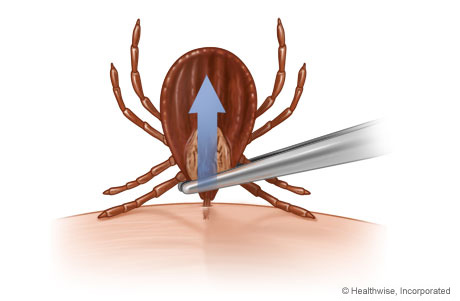Our Health Library information does not replace the advice of a doctor. Please be advised that this information is made available to assist our patients to learn more about their health. Our providers may not see and/or treat all topics found herein.
Topic Contents
Ticks: How to Avoid and Remove Ticks
Overview
Most ticks don't carry diseases. And most tick bites don't cause serious health problems. But it's important to avoid tick bites so you can avoid diseases such as Lyme disease that the tick may pass on during feeding and avoid a skin infection from a bite.
Try these tips for avoiding ticks.
- Avoid areas where ticks are often found.
Learn where ticks and deer that carry ticks are found in your community.
- Cover as much of your body as you can when in grassy or wooded areas.
Wear a hat, a long-sleeved shirt, and long pants with the legs tucked into your socks. Keep in mind that it's easier to spot ticks on light-colored clothes.
- Use insect repellents, such as products with DEET.
- Use products that contain 0.5% permethrin on your clothing and outdoor gear, such as your tent.
You can also buy clothing already treated with permethrin.
- Check for ticks when you come in from outdoors.
- Check all over your body, including your groin, head, and underarms. Comb your hair with a fine-toothed comb, or have someone check your scalp.
- Check your clothing and outdoor gear. Remove any ticks you find. Then put your clothing in a clothes dryer on high heat for about 4 minutes to kill any ticks that might remain.
- Check your pets for ticks after they have been outdoors.
- Check your children daily for ticks, especially during the summer months.
- Clear leaves, brush, and tall grasses from around your house.
Also clear woodpiles and stone fences, and clear the edges of your yard or garden. This may help reduce ticks and the rodents that the ticks depend on.
- Keep deer out of your yard.
Deer often carry deer ticks. Remove plants that attract deer. And use barriers to keep deer out.
- Treat your yard for ticks.
Call your local landscaping nursery or county extension office to see if your yard can be treated with nonchemical or environmentally safe methods.
How to remove a tick

Use fine-tipped tweezers to remove a tick.
- Grab the tick as close to its mouth (the part that is stuck in your skin) as you can.
- Slowly pull the tick straight out (don't twist or yank) until its mouth is released from your skin.
- Avoid pushing on or squeezing the tick's swollen abdomen. Squeezing it can push bacteria into your body.
- If the tick breaks and part of it stays under your skin, do not try to remove the rest of it by digging under the skin. This just causes more skin damage. If you leave it alone, it will be expelled naturally in a few weeks.
- Use soap and water to wash the area where the tick was attached.
- Watch for signs of infection, such as an expanding red rash and flu-like symptoms. Keep in mind that most tick bites do not lead to infection—deer ticks usually have to feed for at least 36 hours before they can pass on bacteria that cause Lyme disease.
Here are some things you should not do:
- Do not try to suffocate the tick with petroleum jelly, nail polish, or rubbing alcohol. This may increase your risk of infection.
- Do not try to burn the tick with a cigarette or match while the tick is attached to your skin.
Related Information
Credits
Current as of: July 31, 2024
Author: Ignite Healthwise, LLC Staff
Clinical Review Board
All Ignite Healthwise, LLC education is reviewed by a team that includes physicians, nurses, advanced practitioners, registered dieticians, and other healthcare professionals.
Current as of: July 31, 2024
Author: Ignite Healthwise, LLC Staff
Clinical Review Board
All Ignite Healthwise, LLC education is reviewed by a team that includes physicians, nurses, advanced practitioners, registered dieticians, and other healthcare professionals.
This information does not replace the advice of a doctor. Ignite Healthwise, LLC disclaims any warranty or liability for your use of this information. Your use of this information means that you agree to the Terms of Use and Privacy Policy. Learn how we develop our content.
To learn more about Ignite Healthwise, LLC, visit webmdignite.com.
© 2024-2025 Ignite Healthwise, LLC.




